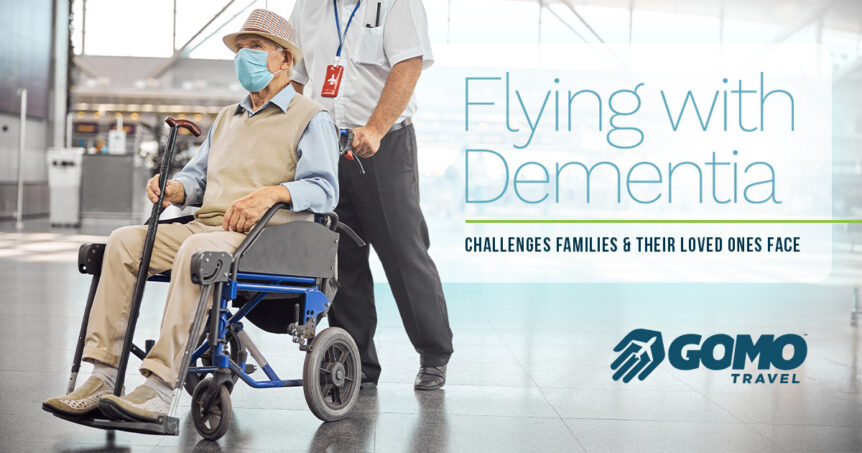Long-distance travel with a loved one who has cognitive issues presents unique challenges that most families don’t anticipate. The combination of unfamiliar environments, disrupted routines, and complex travel logistics can quickly overwhelm someone with cognitive impairment—and their caregivers.
At GOMO Travel, we’ve helped hundreds of families navigate the obstacles of their loved one flying with dementia. We’ve seen how someone experiencing cognitive decline can initially resist assistance but then develop trust with the right approach, even accepting help they’ve never used before, like wheelchair assistance. As Fran from St. Augustine discovered when we helped transport her sister from Hawaii to Florida, professional support can transform what families expect to be a stressful ordeal into a manageable, even positive experience.
If you’re facing a similar situation with a loved one who has cognitive issues, understanding the complexities ahead can make all the difference between a successful journey and a travel crisis.
Why Flying with Cognitive Issues Requires Special Planning
Airports create a perfect storm for individuals with cognitive decline. The constant noise, crowds of strangers, security procedures, and disrupted routines can trigger confusion, anxiety, or disorientation. What might seem like a straightforward travel day to you becomes an overwhelming sensory experience for someone with cognitive issues.
The challenges go beyond simple forgetfulness. Your loved one might not recognize where they are, become frightened by security procedures, or struggle to follow basic travel instructions. These aren’t just inconveniences—they’re safety concerns that require thoughtful preparation.
Risks For Loved Ones and Travelers With Dementia
Pre-Flight Planning
Family members often face significant difficulty adjusting travel logistics—such as flight times, itineraries, or destination details—to accommodate their loved one with dementia. These changes can trigger confusion or anxiety for the traveler, which in turn heightens stress for the caregiver. The unfamiliarity of planning routines, especially when trying to anticipate cognitive needs, adds another layer of emotional and logistical strain before the journey even begins.
Travel to Airport
During the trip to the airport, caregivers may witness heightened anxiety or confusion in their loved one, particularly if the route or mode of transportation is unfamiliar. Disorientation caused by new scenery or changes in routine can lead to agitation, repetitive questioning, or panic, requiring constant reassurance. If the caregiver is also the driver, they may face safety risks due to distractions or difficulty managing both navigation and their loved one’s behavior. Riding with others—especially unfamiliar drivers—can further increase stress, as communication challenges or discomfort may arise. There’s also the persistent concern that the traveler might attempt to exit the vehicle during stops or delays, adding to the caregiver’s vigilance.
Arrival at Airport
Upon arriving at the airport, family members often see their loved one overwhelmed by the busy, noisy, and unfamiliar environment. This sensory overload can intensify disorientation and distress. Navigating large terminals becomes a daunting task, with the constant fear that their loved one may wander or become lost, compounding the traveler’s and caregiver’s anxiety.
Pre-Boarding
Security procedures—such as removing shoes and jackets or temporarily parting with personal belongings—can be especially distressing for someone with dementia. Family members must often intervene or advocate during these moments, which can be emotionally taxing. Long waits and crowded boarding areas add to the confusion, while communication barriers with airport staff may leave caregivers feeling unsupported and their loved one increasingly anxious.
In Flight
Once onboard, caregivers may struggle to soothe their loved one’s agitation or confusion, which can be triggered by unfamiliar surroundings, physical discomfort, or restricted movement. The traveler may not understand the purpose of the journey, leading to repetitive questions or heightened anxiety. In some cases, disruptive behavior—such as refusing to remain seated or expressing a desire to leave—can arise, placing emotional and logistical pressure on the caregiver and potentially affecting other passengers and flight staff.
Arrival
The arrival experience often mirrors the challenges faced at departure. Family members must again manage their loved one’s response to the busy, unfamiliar airport environment, which can provoke distress and disorientation. Upon reaching the destination, confusion may persist, especially if the surroundings are unfamiliar. Difficulty recognizing people or places can lead to wandering or emotional upset, requiring caregivers to remain constantly alert and responsive.
The Benefits of Professional Travel Assistance
To deal with these issues and risks, many families discover that managing and planning for loved ones flying with cognitive issues requires more specialized knowledge and experience than they initially realized and can handle alone. Medical travel companions bring expertise in managing complex travel situations, understanding airline protocols, and providing calm, professional support during stressful moments.
At GOMO Travel, our medical travel companions have experience helping individuals with various health challenges, including cognitive decline, travel safely and comfortably. We understand that successful travel isn’t just about reaching your destination—it’s about preserving dignity and reducing stress for both the traveler and their family.
Our compassionate companionship extends beyond basic travel assistance. We provide experienced travel support, handle hassle-free logistics, and offer mobility assistance when needed. Every traveler has unique needs, and we customize our approach accordingly.
Moving Forward with Confidence
Flying with dementia doesn’t have to be overwhelming when you have the right preparation and support. Whether you choose to travel independently or work with professional medical travel companions, the key is realistic planning that prioritizes comfort and safety for those experiencing cognitive issues.
Remember that asking for help—whether from airline staff, airport personnel, or professional travel services—isn’t a sign of failure. It’s a thoughtful way to ensure your loved one’s travel experience is as positive and stress-free as possible.
Ready to explore how professional travel companions can make your journey easier?
Contact GOMO Travel to discuss customized travel assistance that meets your family’s specific needs.
